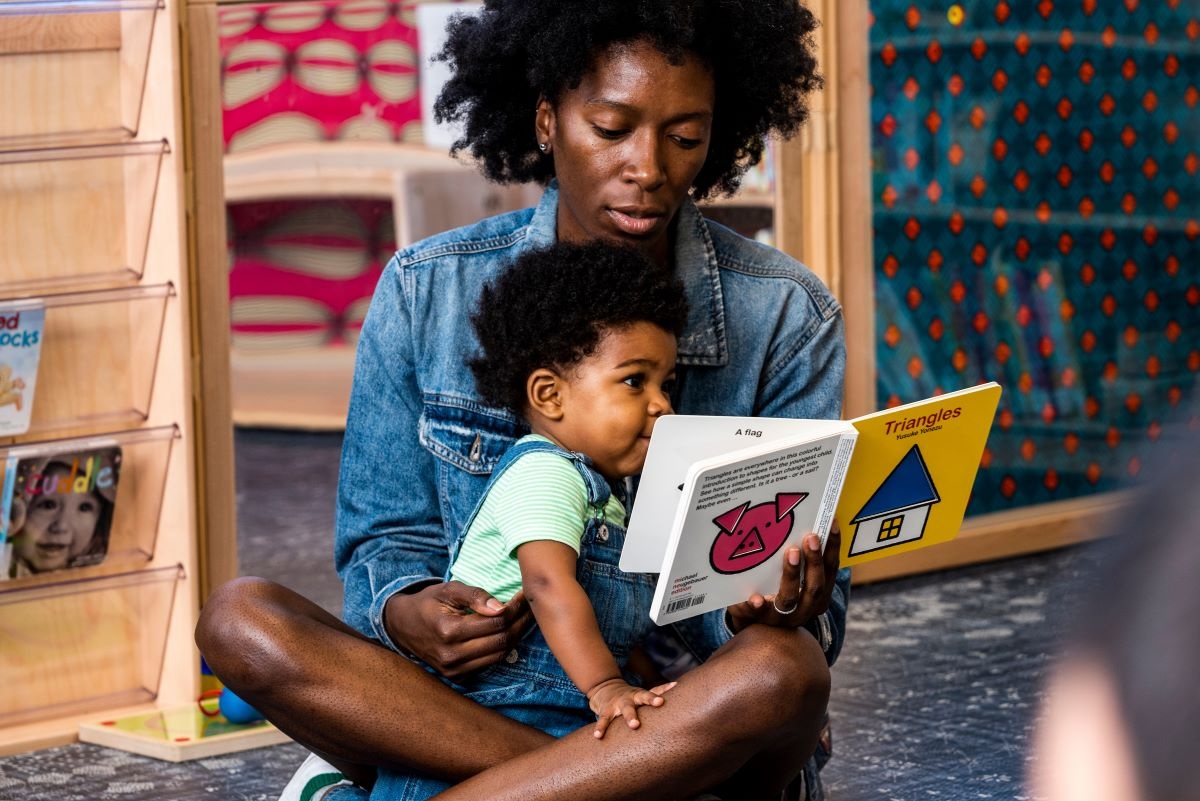Read, Baby, Read: The Power of Talk For Nurturing Your Baby's Brain
By Kimberly G.Read, Baby, Read at the Free Library knows that early childhood matters! We also know that from day one, you want to set the stage for your baby’s lifelong learning, happiness, and success. We are delighted to kick off this blog series that will introduce (or re-introduce!) you to the Read, Baby, Read program while offering evidence-based best practices as well as tips, tricks, and classic advice to help you support your baby’s early literacy journey.
This post will center on the power of talking, and how you can powerfully nurture your child's brain. Let's delve into the reasons why talking is the most important thing new caregivers can do with their babies and explore the significance of talking for a baby’s brain and verbal development.
Why The Early Years Count the Most
The early years of a child’s life (birth–three years old) are the most important because they are the critical period for optimal and healthy brain development. During this time, a baby’s brain undergoes rapid growth, forming essential neural connections that lay the foundation for future learning, language, and cognitive abilities. By the time your child reaches age three, 80 percent of their brain is already developed. Research has proven that both the quality and quantity of experiences in those early years play a vital role in shaping the brain architecture of your baby.
Talking: Fuel for Baby’s Brain
Talking is nourishment for your baby’s growing brain. At birth, babies are hard-wired to absorb and learn from their environment, and language is the key medium through which they learn. Even "baby babble" is not just inarticulate speech, but actually pre-speech; every coo, babble, and word spoken in their presence is contributing to your baby’s brain wiring and development. When you engage in meaningful conversations with your baby, you create an environment rich in stimuli that will spark the brain’s language centers.
Like Tennis, Baby! Serve and Return Conversation
Ideally, when talking with your baby, you want to engage in a serve-and-return conversation. To be clear, you don’t want to talk incessantly and hog the conversation. According to early childhood researchers, you want to emphasize the serve and return (back-and-forth) exchange of words, sounds, facial expressions, and gestures between you and your baby. That back-and-forth is the magic that beautifully builds your baby's brain. When your baby coos, babbles, or makes a sound, then you respond with energy and enthusiasm, all while speaking in "motherese" (now called parentese)!
"Parentese"
Hands down, parentense is the best way to communicate with your baby. Parentese is speaking in a higher-pitched, slower, and stretchy voice. It’s not "goo-goo-ga-ga." It’s more like, “Ohhh…. ahhh… look at my baby. Do you want some of the ba-na-na? Ohhh-kaaay.” With parentese, you are using real words but exaggerating your pitch, slowing down, and stretching out the words in a sing-song fashion. It is also interesting to note the universality of parentese. Regardless of the language spoken, all mothers speak to their babies in this exaggerated and sing-songy way. This interactive process promotes bonding as well as strengthens neural pathways in the brain’s language center, called the Broca's area.
Nothing Is Sweeter Than the Sound of Your Voice!
Your voice, your tone, and your facial expressions all convey emotions and provide a sense of security, love, and comfort to your baby. This emotional scaffolding not only forms the basis for healthy social and emotional development, it also provides opportunities for you to introduce your baby to new concepts, vocabulary words, and ideas — all of which will simultaneously stimulate your baby’s brain and cultivate curiosity.
That was a lot of information, so here are three practical takeaway tips:
- Maintain Eye Contact: Maintaining eye contact during conversations with your baby fosters a deeper connection and helps your baby focus on your facial expressions and speech.
- Sing Songs and Rhymes: Songs, music, and rhymes enhance your baby's language acquisition by exposing them to new vocabulary, rhythm, and melody.
- Read Aloud: Reading age-appropriate board books to your baby provides a multitude of benefits. In addition to bonding over books with your baby, you will introduce new words and concepts, and develop your baby’s pre-reading skills (phonological awareness and letter recognition), as well as help to develop your baby’s hand-eye coordination and fine motor skills!
Talk ain’t cheap, baby! Your role as an intentional, talkative caregiver is one of the most important gifts you can provide to your baby. While a simple act, talking is a powerful tool that nourishes your baby’s brain development, language acquisition, and so much more. So keep on talking and chatting, and keep those conversations flowing. With every word, giggle, and shared moment, watch your baby’s world grow exponentially!
The Free Library of Philadelphia offers a variety of free programs for babies and toddlers at 23 library locations across the city. Read, Baby, Read aims to help our city’s littlest learners develop literacy skills to last a lifetime through fun, interactive activities like singing, movement, music, and more! Learn more now on our event calendar, and find participating Free Library locations near you to join. Stay tuned for additional resources and literary tips on the Read, Baby, Read Instagram page.
Read, Baby, Read is made possible through generous support from the William Penn Foundation to the Free Library of Philadelphia Foundation.
Have a question for Free Library staff? Please submit it to our Ask a Librarian page and receive a response within two business days.

